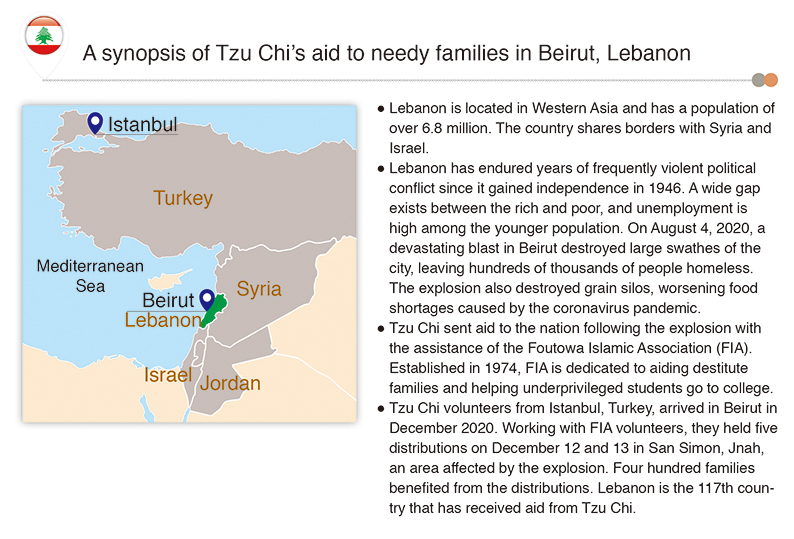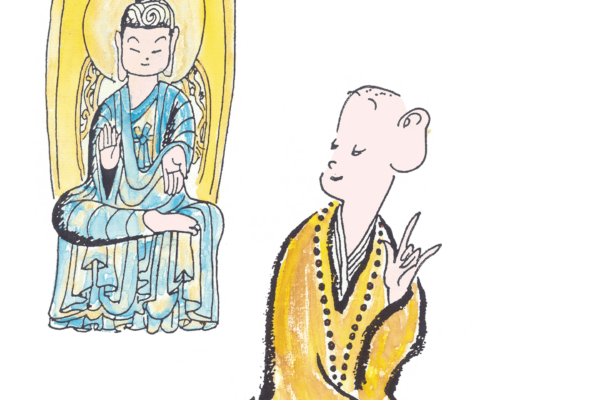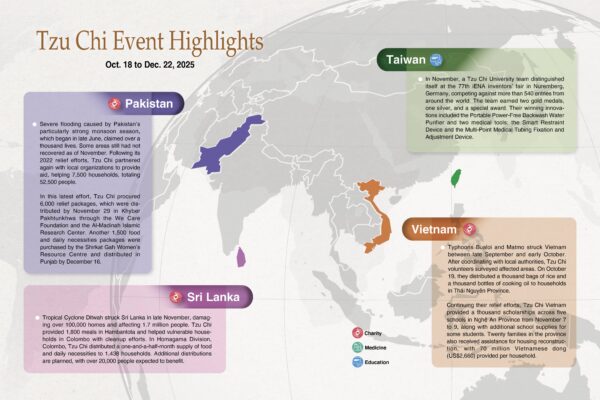By Liao Zhe-min
Translated by Wu Hsiao-ting
Photos by Mohammed Nimr Aljamal
A devastating explosion in Beirut, Lebanon, shocked the world in August 2020. Tzu Chi, with the help of the Foutowa Islamic Association, provided aid to impoverished families in the aftermath.
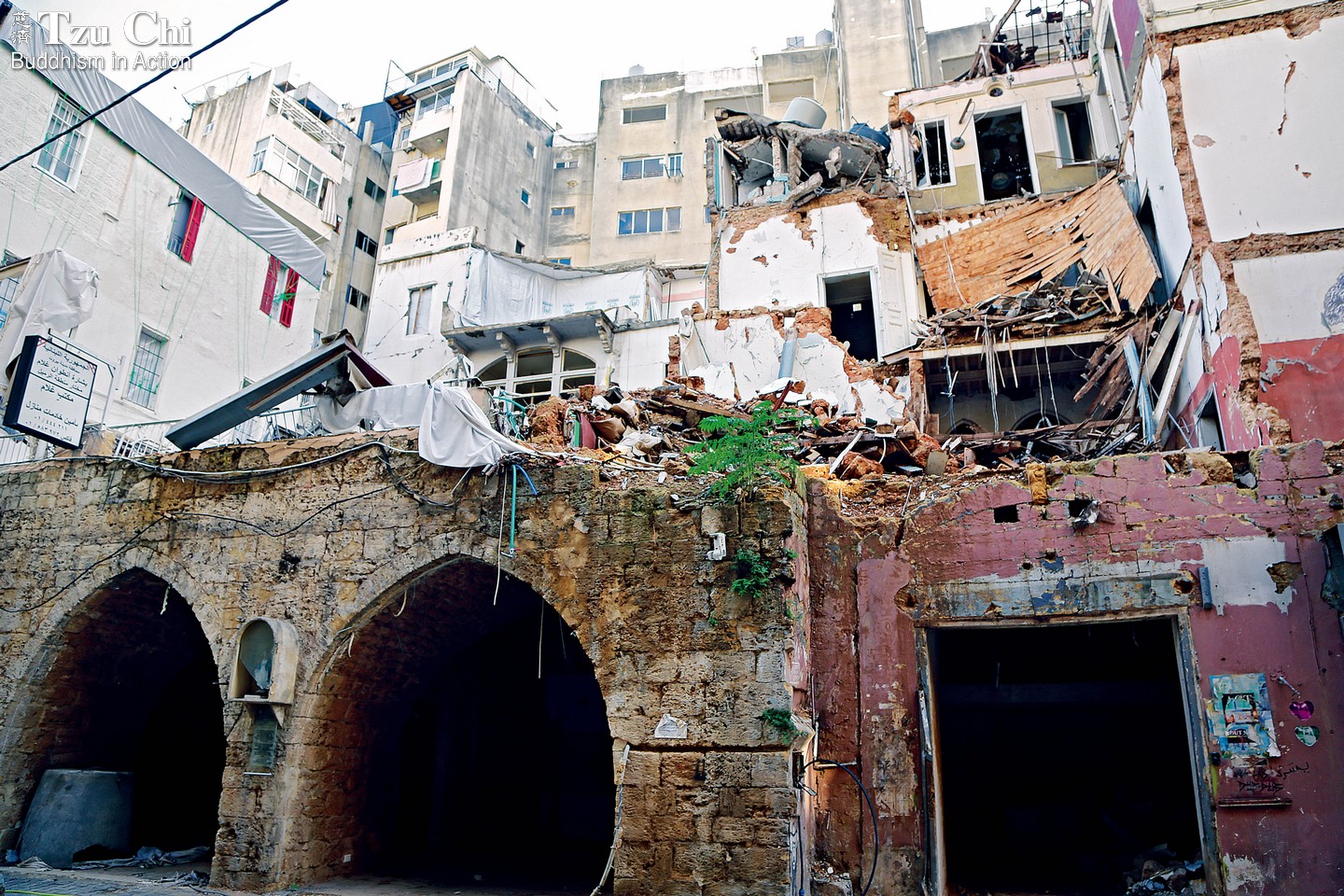
The Port of Beirut (right) is one of the largest and busiest ports in the eastern Mediterranean. A massive explosion, triggered by improperly stored ammonium nitrate, occurred there in August 2020. When Tzu Chi responded to the disaster by holding aid distributions in the city a few months later in December, the damage caused by the blast was still clearly evident.
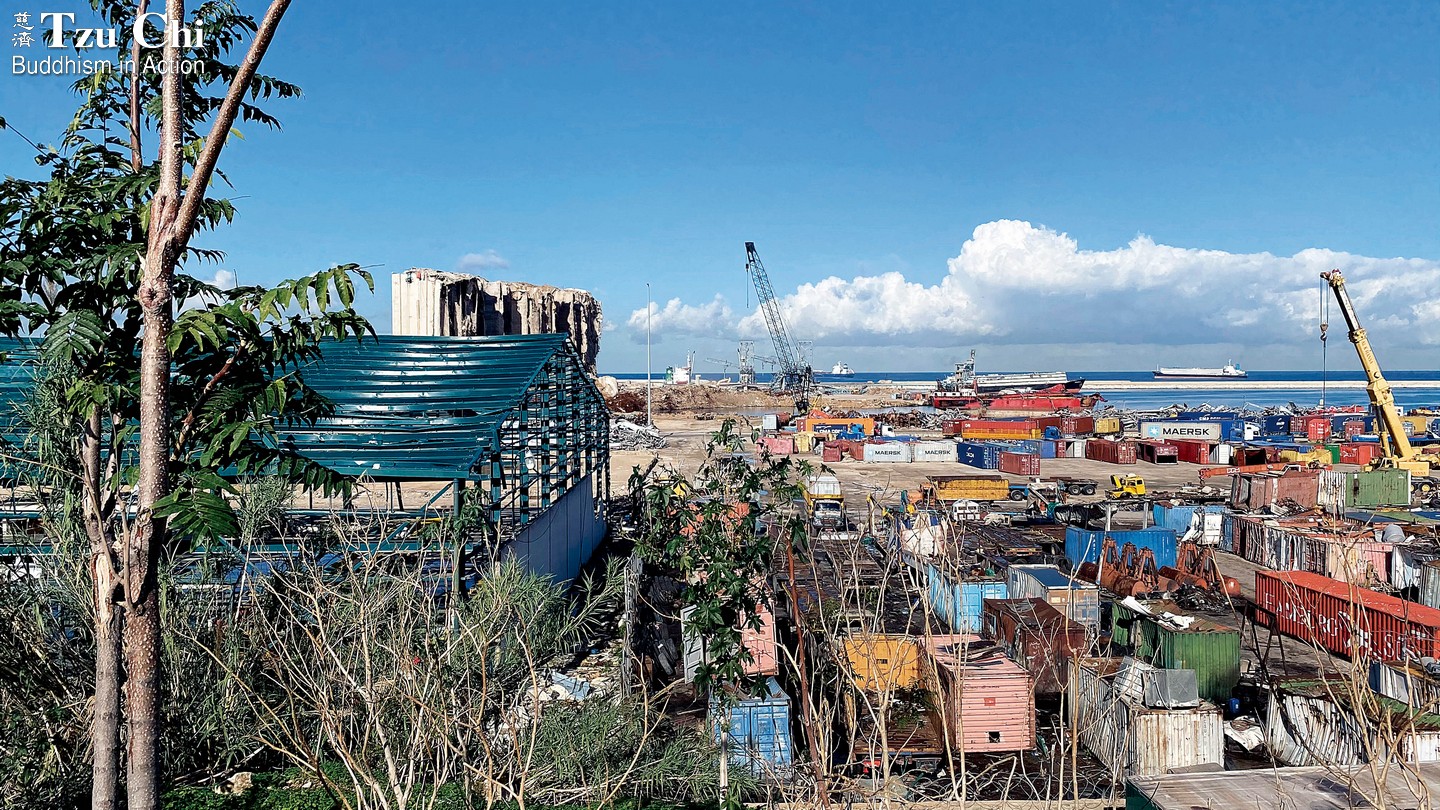
On August 4, 2020, a massive explosion rocked Beirut, Lebanon’s capital. The blast ripped through a large part of the city, and was, according to experts, one of the biggest non-nuclear explosions in history. Over 200 people were killed and thousands more wounded. The blast zone was a wasteland of rubble and charred debris, the devastation so great that the scene was likened to one right out of Armageddon. The Lebanese economy has for years struggled under the weight of sectarian conflicts and the influx of Syrian refugees. The explosion just rubbed salt into those wounds.
After the blast, the Tzu Chi Foundation sought ways to help the survivors. Foundation volunteers in Turkey eventually obtained the assistance of a charity organization in Lebanon, the Foutowa Islamic Association (FIA). With the help of FIA, Tzu Chi was finally able to offer five distributions in Jnah, an affected area in Beirut, in December 2020. The aid came none too soon for impoverished families there desperately in need of help.
Poverty and illness
One way in which volunteers from FIA cooperated with Tzu Chi was to conduct home visits to establish recipient rosters for Tzu Chi distributions. One day, as the FIA volunteers were making their rounds, they encountered Noor, a three-year-old girl. She poked her head out a doorway and asked an FIA volunteer: “Could I have that piece of paper [a home visit form]?” The volunteer responded, “A form like this is for adults to fill out.” But the girl was not one to give up easily. She pursued by saying, “But I’m very hungry too. Could you take a picture of me and then give me something to eat?”
Noor’s questions and her plight wrenched the hearts of the volunteers. They snapped a photo of her, then sent the picture to Tzu Chi volunteers in Turkey. Tzu Chi Turkey later used the photo of Noor on the cover of an Arabic version of the Tzu Chi Monthly magazine.
The FIA volunteers’ visit to Noor’s building had taken place in October 2020. Two months later, in December, three Tzu Chi volunteers from Turkey arrived in Lebanon to take part in the upcoming distributions. “I’ve been through war in my country,” said Ahmed Aliyan, one of the volunteers, “but the devastation caused by the explosion in Beirut was worse than anything I’ve ever seen.”
Aliyan was the deputy principal of El Menahil International School, an institution for Syrian refugee children established by Tzu Chi and the government of the Sultangazi district of Istanbul. Aliyan had fled the war in Syria, his home country, in 2013. He arrived in Lebanon, before eventually moving on to Turkey and settling down in that country. Despite being a highly educated intellectual, he had to take factory jobs in Turkey to make a living. He became a Tzu Chi volunteer after receiving aid from the foundation in 2015.
Despite having experienced war firsthand, Aliyan was shocked by his visit to Beirut, where the destruction wreaked by the explosion was still very visible. Many buildings were badly damaged, with broken windows shielded by drapes. “It looked like this within a radius of five kilometers [3.1 miles] of the blast,” he said. “The sight was heart-wrenching.”
Aliyan and his fellow volunteers arrived at a slum area in San Simon, Jnah, to visit some needy families. The slum was home to refugees from Palestine and Syria as well as some local destitute people. An area like this is usually out of bounds for foreigners; it was only through the help of local neighborhood leaders that the volunteers were able to visit the needy here.
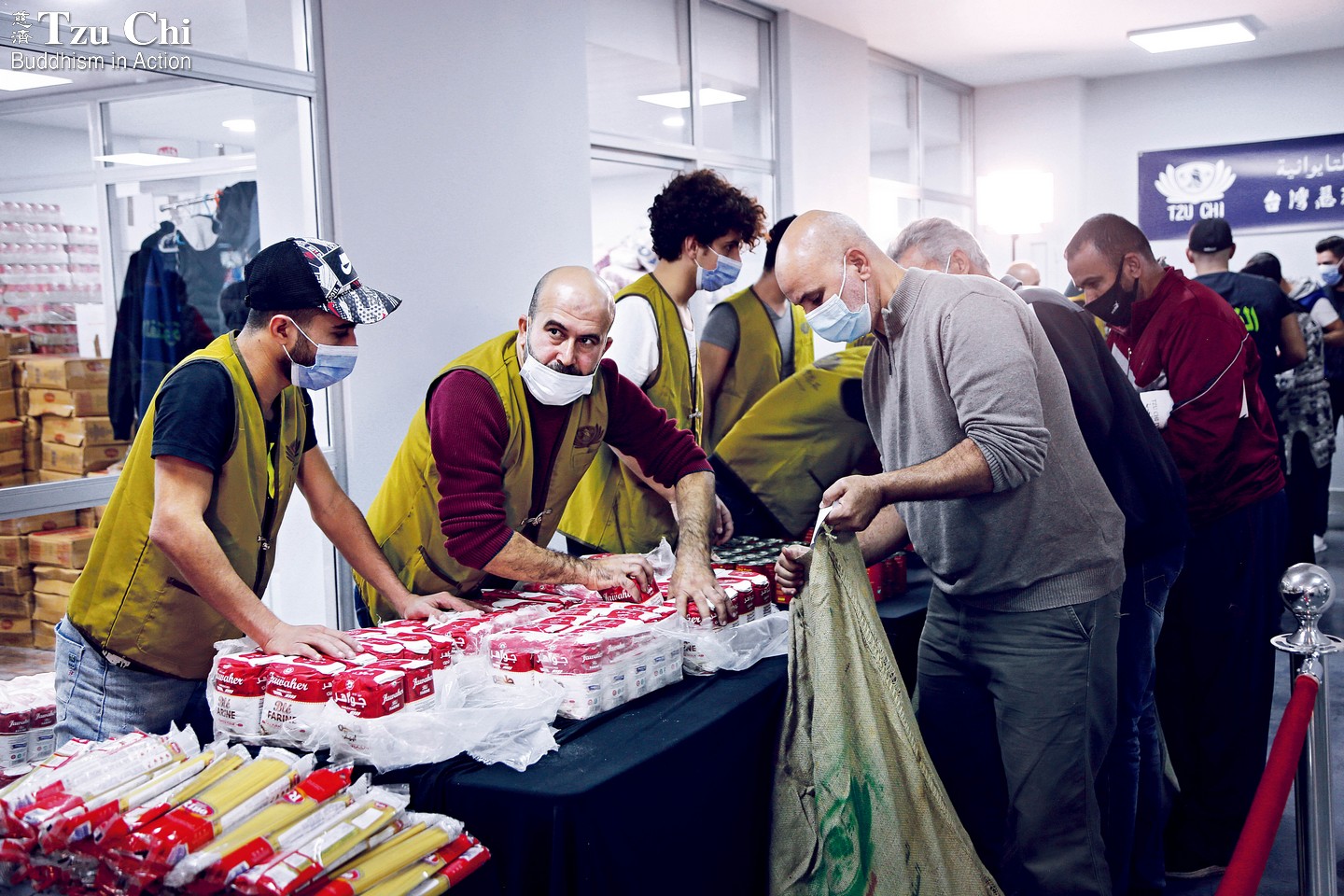
Volunteers from the Foutowa Islamic Association helped Tzu Chi conduct distributions to the needy after the explosion. Every family received 29 kilograms of food, enough to last them for a month.
What the volunteers saw in the slum saddened them even more. Standing water and trash were everywhere on the streets. Shabby, disorderly buildings contained tightly packed housing units. Every home was damp and cramped, with bathroom and kitchen facilities and places to sleep all squeezed together. “They looked like places for animals instead of people.” Aliyan said, recalling the dismal scene.
A woman who appeared to be in her 60s lived in one of the units. When the volunteers arrived, she was surprised and suspicious. “What do you want?” she asked warily. She couldn’t believe they had come to help her. A cleaning lady by profession, she suffered from a respiratory disease and required the use of a ventilator. However, she hadn’t paid her utility bills in two months and so her electricity had been cut off. Her life was in danger, but she told the visitors she had placed her life in the hands of Allah.
Another resident was a 50-year-old man, a victim of diabetes. His lungs were compressed by the fluid that had accumulated in his abdomen, preventing him from working. As a result, he had no money to seek medical attention. His older brother had died, and he had only his sister-in-law to take care of him. Getting by was extremely hard, and he often had to go without food. He also had a thyroid condition that needed surgery, but the operation would cost nearly a million Lebanese pounds (US$663). “I don’t even have a thousand pounds [US$0.66],” the man lamented.
Yet another resident was a young father. The man had suffered a bad cut on his foot. The wound had been sutured, but it continued to show signs of infection and was very painful. Despite that, the man had to continue working to support his family.
“The locals who showed us around told us that what we had seen and the people we had met were just a tiny fraction of the local poor population that needed help,” said Sayed Alhomsi, another volunteer from Turkey. His heart was heavy from all that he had witnessed. Like Ahmed Aliyan, Alhomsi was also a Syrian refugee. He said, “When I return to Turkey, I’ll tell every Syrian family I know that life might be hard for them, but people here have it worse. I’ll also let them know that their donations had been put to good use helping these families.”
Five Tzu Chi distributions were held on two days in December 2020, benefiting 400 families. Alhomsi oversees distribution affairs at the Tzu Chi Turkey office. Before the distributions, he shared with FIA volunteers the guiding spirit for Tzu Chi volunteers and how the foundation conducts its distributions. “We treat our aid recipients with respect,” he explained. “Instead of thinking that we are in a higher position than they are [because we are the aid givers], we regard them as our family. We make them feel at home with a smile.” He also shared how he and other Tzu Chi volunteers in Turkey had been exposed to the Tzu Chi spirit of Great Love and how they had learned to live it out.
Rising from the rubble
“I’m touched by these volunteers from FIA,” said Alhomsi. “Their day jobs are tiring enough, but they still sacrifice what time off they have to serve others. They all embrace a passion for serving others and hope they can do more.”
Due to a local shortage of personal protective equipment, the Tzu Chi volunteers from Turkey, well versed in conducting distributions, showed the FIA volunteers how to set up circulation routes and place chairs far apart enough to allow social distancing.
Bag after bag of rice, lentils, chickpeas, and powdered milk blanketed the desks at the venue. Every family was eligible to receive 29 kilograms (64 pounds) of food. Other aid items included blankets and gas-fueled heaters. Tzu Chi also provided face masks because of the pandemic.
People left the distributions smiling, laden with the gifts they had received from Tzu Chi. Alhomsi asked an elderly man at the first distribution if he was happy. The man responded with a sincere expression: “I hope Allah bestows joy on you all!”
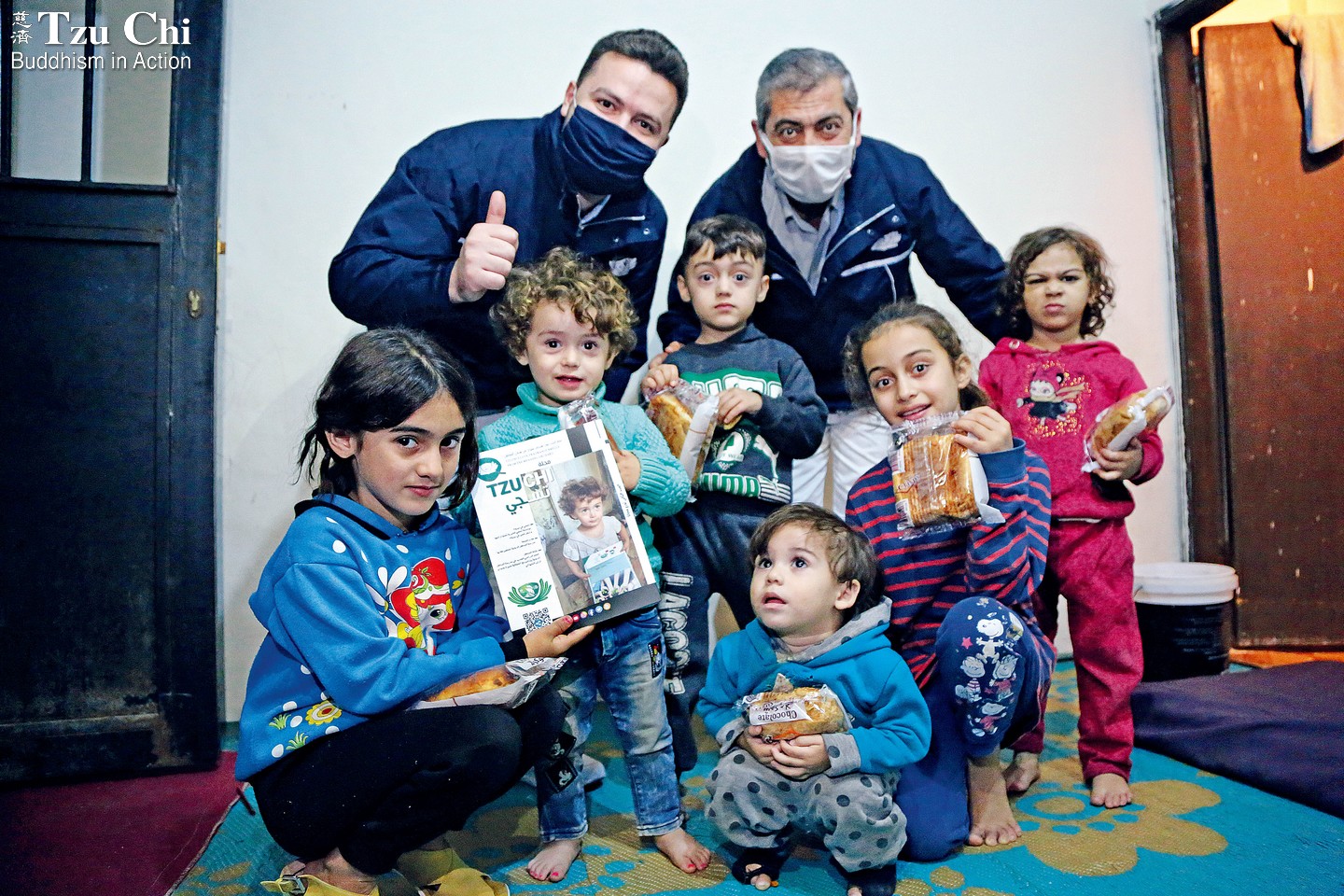
Tzu Chi volunteers from Turkey visited Noor (second from left), a three-year-old girl in San Simon, Beirut. Noor’s photo was featured on the cover of an Arabic version of Tzu Chi Monthly.
Volunteers told participating families at each distribution that the Philippines had recently been pummeled by Typhoons Goni and Vamco, and that Tzu Chi volunteers were working hard there to help those affected. Hearing about the assistance that Tzu Chi was rendering elsewhere moved many aid recipients to action. Many took out money from their pockets and donated it to Tzu Chi to help with the foundation’s relief operations for the typhoons. Some turned to others beside them and asked, “Can you lend me a little money to donate to Tzu Chi? I’ll return it to you later.” Even Noor, the three-year-old girl mentioned earlier in this article, donated her father’s pay for half a day’s work to Tzu Chi. When she and her dad deposited their donation into a coin bank held out by a volunteer, those around the pair said to them, “May Allah give you a bountiful reward for your kindness!”
After seeing people donating what they could to help typhoon victims in the Philippines, Mohammed Nimr Aljamal, one of the volunteers from Turkey, said that he hoped that the help from Tzu Chi will inspire the aid recipients to reach out when they meet people in need of help in the future, in the same way that Syrian refugees in Turkey had done after they were aided by Tzu Chi.
FIA has been helping impoverished people in Lebanon for nearly half a century. Ziyad al-Saheb, head of FIA, was happy that his organization could work with Tzu Chi to serve local needy people. “I feel from the bottom of my heart that the spirit demonstrated by Tzu Chi—humanitarianism, benevolence, mutual help, and unconditional giving—is the same spirit Islam has taught me,” he said. “Such spirit embodies the love we humans should embrace for each other.”
A civil war that lasted from 1975 to 1990, persistent political dysfunction, and economic instability have led to the poor state of the country’s infrastructure and a wide gap between the rich and the poor. The explosion only added to the challenges facing the country. Tzu Chi reached out to help after the tragedy, abiding by the belief that the hope of mankind comes from mutual help. It’s with love and help that hope rises from the rubble.
